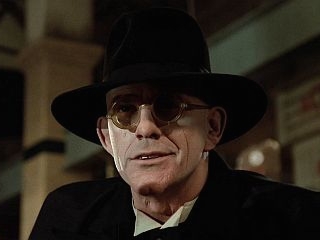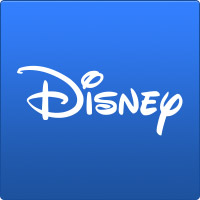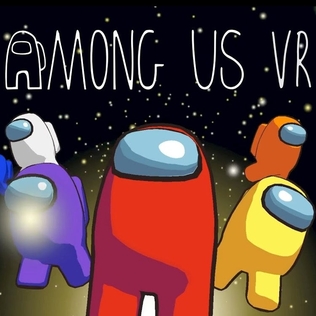
Goofy is a cartoon character created by The Walt Disney Company. He is a tall, anthropomorphic dog who typically wears a turtle neck and vest, with pants, shoes, white gloves, and a tall hat originally designed as a rumpled fedora. Goofy is a close friend of Mickey Mouse and Donald Duck, and is Max Goof's father. He is normally characterized as hopelessly clumsy and dim-witted, yet this interpretation is not always definitive; occasionally, Goofy is shown as intuitive and clever, albeit in his own unique, eccentric way.

Who Framed Roger Rabbit is a 1988 American fantasy comedy film directed by Robert Zemeckis from a screenplay written by Jeffrey Price and Peter S. Seaman. It is loosely based on the 1981 novel Who Censored Roger Rabbit? by Gary K. Wolf. The film stars Bob Hoskins, Christopher Lloyd, Stubby Kaye, Joanna Cassidy, and the voices of Charles Fleischer and an uncredited Kathleen Turner. Combining live-action and animation, the film is set in an alternate history Hollywood in 1947, where humans and cartoon characters co-exist. Its plot follows Eddie Valiant, a private investigator with a grudge against toons, who must help exonerate Roger Rabbit, a toon framed for murder.

The Incredible Machine (TIM) is a series of video games in which players create a series of Rube Goldberg devices. They were originally designed and coded by Kevin Ryan and produced by Jeff Tunnell, the now-defunct Jeff Tunnell Productions, and published by Dynamix; the 1993 through 1995 versions had the same development team, but the later 2000–2001 games have different designers. All versions were published by Sierra Entertainment. The entire series and intellectual property were acquired by Jeff Tunnell-founded PushButton Labs in October 2009. PushButton Labs was later acquired by Playdom, itself a division of Disney Interactive, so as of now the rights are held by The Walt Disney Company.

Mickey's Toontown is a themed land at Disneyland and Tokyo Disneyland, two theme parks operated by Walt Disney Parks & Resorts and The Oriental Land Company respectively. At Tokyo Disneyland, this land is named Toontown. A similar land existed at the Magic Kingdom until 2011 and was named Mickey's Toontown Fair. Walt Disney Studios Park in Disneyland Paris has a related land called Toon Studio.

Judge Doom is a fictional character and the main antagonist in the 1988 film Who Framed Roger Rabbit, portrayed by Christopher Lloyd. He is depicted as the much-feared, cruel, and evil judge of Toontown, who later in the film is revealed as the mastermind behind the framing of the titular character and the murder of protagonist Eddie Valiant's brother.

Roger Rabbit's Car Toon Spin is a dark ride located at the Disneyland and Tokyo Disneyland theme parks, based on the 1988 Disney/Amblin film Who Framed Roger Rabbit. Both versions of the attraction are located in Mickey's Toontown. The Disneyland version opened on January 26, 1994, a year after the Mickey's Toontown area opened, and the Tokyo Disneyland version opened on April 15, 1996. In December 2021, the Disneyland version was updated to include a new plot element of Jessica Rabbit in the role of a detective who is determined to stop a crime wave in Toontown.

Pirates of the Caribbean Online was a 3D massively multiplayer online role-playing video game based on the Pirates of the Caribbean franchise. It was developed and published by Disney Online, in conjunction with SilverTree Media, for Microsoft Windows and Mac OS X, with additional post-release content developed by Schell Games. The game was first announced by The Walt Disney Company in April 2005, and was originally meant to coincide with the release of Pirates of the Caribbean: Dead Man's Chest in 2006, but its release was pushed back multiple times. The game went through two beta testing phases during 2007, and was officially released in October of that year, utilizing the Panda3D game engine. Pirates of the Caribbean Online was closed on September 19, 2013.

Club Penguin was a massively multiplayer online game (MMO), involving a virtual world that contained a range of online games and activities. It was created by New Horizon Interactive. Players used cartoon penguin-avatars and played in an Antarctic-themed open world. After beta-testing, Club Penguin was made available to the general public on October 24, 2005, and expanded into a large online community, such that by late 2007, it was claimed Club Penguin had over 30 million user accounts. In July 2013, Club Penguin had over 200 million registered user accounts.

disney.com is a website operated by Disney Digital Network, a division of The Walt Disney Company, that promotes various Disney properties such as films, television shows, and theme park resorts, and offers entertainment content intended for children and families.
The history of massively multiplayer online games spans over thirty years and hundreds of massively multiplayer online games (MMOG) titles. The origin and influence on MMO games stems from MUDs, Dungeons & Dragons (D&D) and earlier social games.

Rubber hose animation was the first animation style that became standardized in the American animation field. The defining feature is a curving motion that most animated objects possess, resembling the motion and physical properties of a rubber hose. While the style fell out of fashion by the mid-1930s, it has seen a renewed interest in recent years.

Who Framed Roger Rabbit is a media franchise owned by The Walt Disney Company and Amblin Entertainment, that began with the 1988 film, Who Framed Roger Rabbit, itself based on a book titled Who Censored Roger Rabbit? by Gary K. Wolf.

Jesse N. Schell is an American video game designer and author, as well as the CEO of Schell Games, and a distinguished professor of the practice of entertainment technology at CMU's Entertainment Technology Center (ETC), a joint master's program between the College of Fine Arts and School of Computer Science in Pittsburgh, Pennsylvania.

Pixie Hollow was a massively multiplayer online role-playing game (MMORPG) addition to the Disney Fairies franchise that ran from 2008 to 2013. It was produced by DisneyToon Studios and developed by Schell Games. The game was released to coincide with the 2008 film, Tinker Bell and revolved around Tinker Bell, a fairy character created by J. M. Barrie in his play Peter Pan and incorporating her fairy friends from the Disney Fairies animated works by the Walt Disney Company.

Disney Infinity is a 2013 toys-to-life action-adventure game published by Disney Interactive Studios. It was announced on January 15, 2013. The game used collectible figurines that were then synchronized with the game, unlocking characters from Disney and Pixar properties that interact and go on adventures. The game was released for Xbox 360, PlayStation 3, Wii, Wii U, and Nintendo 3DS in August 2013. A PC version of Toy Box was also released on November 14, 2013. The game had a budget approaching $100 million. A sequel, Disney Infinity 2.0, was released on September 23, 2014. The third edition, Disney Infinity 3.0, was released on August 30, 2015, and introduced support for the Apple TV. This game was also later released on Microsoft Windows in 2013.

Starr McAuley Long is an American game developer, a long time collaborator with Richard Garriott at the companies Origin Systems (1992–2000), Destination Games (2000–2008), and Portalarium (2013–present). In 1997, Long was the original director of the early graphical multiplayer game Ultima Online, and from 2008–2013 he was executive producer at The Walt Disney Company, where he created and managed several educational games and apps for Club Penguin and the Disney Connected Learning platform. In early 2008, he was listed as one of the Top 20 Most Influential People in the MMO industry. In 2013, he again partnered with Garriott at Portalarium, where they began working on a new game Shroud of the Avatar.

Roger Rabbit is a fictional animated anthropomorphic rabbit. The character first appeared in author Gary K. Wolf's 1981 novel, Who Censored Roger Rabbit? In the book, Roger is second banana in a popular comic strip, "Baby Herman". Roger hires private detective Eddie Valiant to investigate why his employers, the DeGreasy Brothers, have reneged on their promise to give Roger his own strip. When Roger is found murdered in his home, Valiant sets out to look for the killer, with the help of Roger's "doppel".

Club Penguin was a media franchise that was created in 2005 with the release of the online massively multiplayer online game (MMO) Club Penguin, later bought out by Disney. Club Penguin inspired a variety of console video games, books, and television specials. Following the game's discontinuation in March 2017, the game was replaced by a successor, Club Penguin Island (2017), which was released on mobile and desktop, and an unlicensed recreation, Rewritten (2017). However, Island was discontinued in November 2018, while Rewritten was ordered shut down by Disney in April 2022, effectively ending the franchise.

Among Us is a 2018 online multiplayer social deduction game developed and published by American game studio Innersloth. The game allows for cross-platform play; it was released on iOS and Android devices in June 2018 and on Windows later that year in November. It was ported to the Nintendo Switch in December 2020 and on the PlayStation 4, PlayStation 5, Xbox One and Xbox Series X/S in December 2021. A virtual reality adaptation, Among Us VR, was released on November 10, 2022.

Among Us VR is a social deduction video game developed by Schell Games, Innersloth, and Robot Teddy. The game is a virtual reality version of Among Us. It was published by Innersloth in November 2022 for Quest 2 and Windows via several SteamVR-supported headsets. A PlayStation 5 version via the PlayStation VR2 was released in December 2023.



















